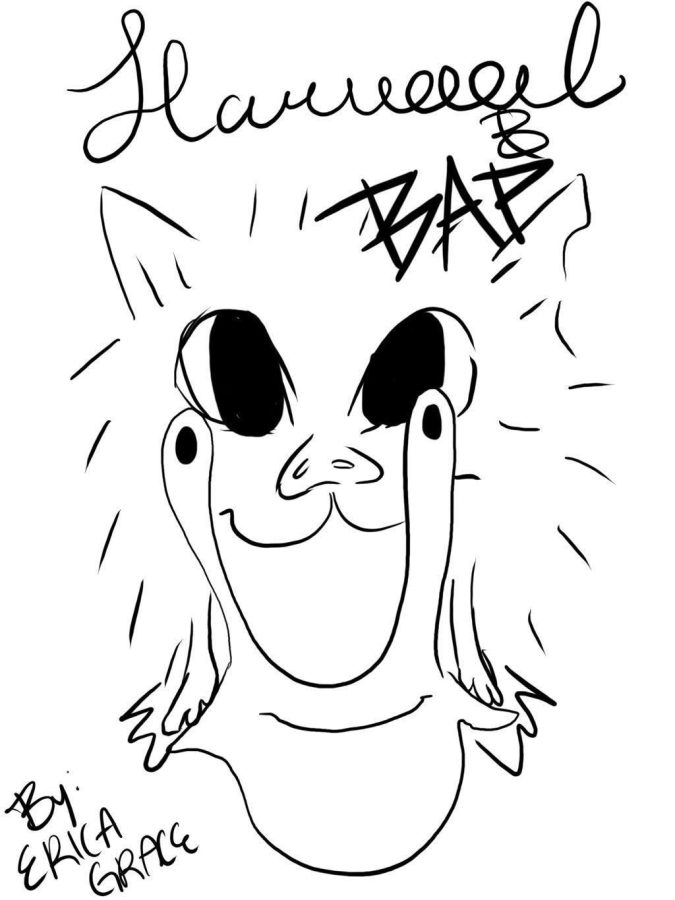I had taken from my bad the dictionary that I always carried with me for emergencies and placed it on the small table next to me. I sank into my chair, paused, and said, “Dr. O’Brian! What will I do if he dies?”
The light shining from behind him didn’t allow me to see his face clearly, but it was enough for me to see the expression of his face in that semi-dark room turn serious. The fresh morning light cut and highlighted the lines of his face like a meticulous painter, from the space behind his desk, to the books piled up but seemingly arranged with a special disorder. He was typing on his computer when he heard this sentence, and so he stopped.
Until then, everything Dr. O’Brian and I had talked about was either about my professor—how to build a relationship with him instead of coming here, sitting in front of him, and complaining that my professor was a tough unapproachable person, I should be thinking of solutions—or about how to organize my daily schedule, where to go for walks, and what to think about and see while walking. He had strongly urged me not to think about the past, not to talk to myself, and to enjoy the present. But that day, the discussion had reached family, and no matter how much I flipped through my dictionary, I couldn’t find a word for “ghorboonesh beram,” “talloq e khater shadid,” or “nafas am-e.” So I said, “What will I do if he dies?”
He turned his back to me. From where he was sitting, he stretched out his hand and, from between the row of books stacked almost up to his waist, grabbed his box of cornflakes. Then he turned back towards me and gave me a brief look as I sat there with my mouth slightly open, waiting, but he didn’t say anything. He took a banana and two boxes of raspberries from the drawer under his desk. From above his computer, right where his colorful certificates were framed and hung on the wall, he grabbed his bowl. Dr. Michael Sympathize, who, according to the evidence of those certificates on the wall, had also taught at universities in Tehran and had shown great patience in educating Iranian students, was slowly placing his banana and raspberries on his cornflakes. He said, “Why don’t you call me Mike?” and buried his head in his desk drawer, producing a spoon after a few minutes. He hadn’t yet dipped the spoon into the bowl when he brought the bowl forward and said, “Have you had breakfast? I haven’t,” and took the first spoonful.
I shook my head to say no.
As he was chewing his first spoonful of raspberries and bananas, he said, “Are you talking about your father?”
I had my head down, fiddling with the handle of my red bag, which had become so dirty it was almost black. I didn’t know why I didn’t wash it or why I didn’t buy a new bag. Maybe because I thought that once something was mine, it should stay with me for life.
I said, “My father.”
It was ridiculous that the thought of my mother’s death never crossed my mind. Frustrated, I ran my hand through my hair and wanted to say that the thought of never hearig his small laughs again or his unique way of sitting behind the couch with his worn-out brown slippers was killing me. But I realized that I couldn’t translate these feelings at all. Translating all these emotions and images felt like trying to translate my father.
I said, “When I think about him dying, I want to kill myself. My hands and feet go numb when I think he’s dead, and that I could have missed it. And worse, the thought that I wasn’t with him while he was alive is unbearable,” and I added, “My family is the most important thing I have in this world.”
He stopped typing to ask questions. He looked at me and said, “When you think about it, how much do you cry?”
But I never cried when thinking about this issue. Death might have been the only thing that made me numb.
I said, “I don’t cry.”
He took a deep breath—a deep breath that made me feel ashamed. After all, he had asked me to live in the present, and now I am thinking about the future. I had made things worse. So, I never lifted my head from my bag again and continued playing with the bag’s handle. I pulled the right-side thread of the handle so hard that it came off. I looked at the half-torn handle in my hand helplessly.
Mike put his food aside, locked his hands under his nose, and stared at the picture above his computer. He ran his hand over his bald head. The photo was a red one, from the old days of the 1950s. He was standing in ski gear in front of Mount Damavand. Mike was tall and broad-shouldered. He always wore a dark green jacket that made him look a bit smaller. He was bald, or maybe he shaved his head. His ears looked bigger than usual, and the three earrings in each ear also made his ears look bigger. He stood up. His shadow in that small room felt like the shadow of death looming over me. Then he started pacing. He had his head down and occasionally ran a hand over it. He sighed and said:
“You know…death is for everyone.”
I had heard that many times. I nodded in agreement.
He said, “Don’t think you’re alone…I’ve thought about death many times, too.”
I nodded again.
He said, “I’ve experienced it.”
I asked, “You mean you died and came back?”
He said, “No…When she died, I wasn’t there. I was in Iran.”
I said, “Oh no…”
He said, “I was always around her. I took care of her. She was with everywhere, listening to what I said.”
It was becoming painful.
I mumbled, “Your wife???”
He said, “I was in Iran when she died. She was sick, and when I left, she was already ill. She couldn’t come with me. When my mother called and said she was dead, I couldn’t believe it.”
I didn’t quite understand his last words. His words came out in faint, unclear sounds from the back of his throat. His voice had changed. I said, “and?”
He said, “I couldn’t forgive myself… I kept thinking, why did I leave her? How could I leave her and go? But I held myself back from crying.”
My eyes widened. I pulled myself out of the chair and asked:
“You didn’t cry at all?”
He said, “I did. Three days later…we had a meeting with other foreign professors from other faculties and universities when I suddenly burst into tears.”
I asked, “Why all of a sudden?”
He said, “One of the professors showed me a photo of himself with his dog in a villa in northern Iran.”
I said, “So? What does that have to do with your wife?”
He said, “Wife? What wife? I’m talking about my dog. I was so jealous and envious that I almost had a stroke. I couldn’t stand seeing a dead dog while someone else was showing me how they put their dog under their arm, went on a trip, played with it, and had fun.”
I slumped into the chair.
He said, “I told the guy I’d be right back. Then I went to the bathroom. I sat down on the toilet and cried as much as I could.”
He took a small towel from his pocket, wiped his head, and put it back in his pocket. He said:
“I had a towel like this…I buried my head in it and cried. I told myself, you’re crazy…your dog is dead, and it’s probably in heaven right now, having fun with other dogs, and here you are, sitting and crying? But my tears wouldn’t stop.”
As he was saying this, his face turned redder and redder. He sat down and stared at his picture in Iran. Sometimes, he would squint his eyes. His silence grew longer. I even felt that, for a few moments, he wasn’t breathing. He turned in his chair. He opened his mouth to say something, but suddenly, his tears burst out. I felt deeply ashamed for bringing up the subject of death with him. For making him realize how unlucky he was to have an Iranian patient who every time he visited her, he would inevitably be reminded of Iran and then of his dead dog. But there was nothing I could do and on that point, it was difficult to insist about my feeling about my dad. I let go of the half-torn handle of my bag and hugged him. The tall, broad-shouldered Mike no longer seemed big to me. He had shrunk. I told myself that even the sense of death shrinks a person.
He said, “When I thought about how I could have been there in the last moment, as my mother described, when she was calmly lying on the bed with her eyes closed, and I wasn’t, I felt miserable. After that meeting, whenever I thought about it, I would cry. In class, in the car, in the kitchen…but then I made peace with myself…”
I said, “That’s great… How?”
He said, “Whenever I thought about her death, I told myself she is comfortable in heaven now, and that I had a good life with her here. So after a while, she came into my dreams. She was jumping around in the meadows, and I was there with her, and we were happy together.”
I said, “That’s great…how wise.”
He took the towel from his pocket, and as he was wiping his head, he said:
He took his towel from his pocket and stepped out beside me. He wiped his nose and, as he was picking up his bowl of cornflakes, asked, “When should the next meeting be?” I said, “Wednesday.” Then, out of courtesy, I thanked him for sharing his story with me. But I could no longer tell him how good it was that he at least believed in heaven and hell, and in an afterlife. And how good it was that his dog had never taken apart an old cuckoo clock in front of him, never pulled out the innards of the clock and worked on it for two hours to fix it, only to make me realize that a human being is like a machine: once its innards are out and it’s broken down, it cannot be made like new, and sent to another world as it was said in our religious books As I was closing the door behind me, I saw him pulling the towel over his head and murmuring, “Goofy! Oh, dear Goofy!”





